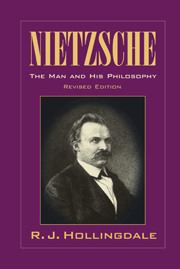Book contents
- Frontmatter
- Contents
- Preface to the Revised Edition
- A List of Nietzsche's Works
- Part I 1844-1869
- Part II 1869-1879
- 4 The Professor
- 5 Wagner, Schopenhauer, Darwin and the Greeks
- 6 Basel and Bayreuth
- 7 Sorrento and an End in Basel
- Part III 1879-1889
- PART IV 1889-1900
- Postscript 1999
- Selective Bibliography
- Index
4 - The Professor
from Part II - 1869-1879
Published online by Cambridge University Press: 13 September 2019
- Frontmatter
- Contents
- Preface to the Revised Edition
- A List of Nietzsche's Works
- Part I 1844-1869
- Part II 1869-1879
- 4 The Professor
- 5 Wagner, Schopenhauer, Darwin and the Greeks
- 6 Basel and Bayreuth
- 7 Sorrento and an End in Basel
- Part III 1879-1889
- PART IV 1889-1900
- Postscript 1999
- Selective Bibliography
- Index
Summary
He who possesses greatness deals harshly with his virtues and interests of the second rank. (FW 266)
Basel was a completely German town, and it had a narrow escape from incorporation into the Reich. When Nietzsche joined it the university there was already 400 years old; it was a small one, but its reputation extended far beyond the borders of Switzerland, and the fact that it engaged him at all at so young an age showed it was willing to experiment.
Upon his arrival he took up temporary lodgings while he looked for a permanent residence. He found it after two months at No. 45 Schiitzgraben, near the Spalentor, where he engaged a large room. When Franz Overbeck came to Basel he lived in the same house, and almost every evening for five years he and Nietzsche had their meal together in Overbeck's room.
The task Nietzsche had taken on was not a particularly light one. He tells Ritschl in a letter of the 10th May 1869 that he has enough to do ‘not to get bored’:
Each morning of the week I give my lectures at 7 o'clock, [he writes.] On Mondays I hold a seminar, … on Tuesdays and Fridays I have to teach at the High School twice, on Wednesdays and Thursdays once: up to the present I enjoy this … I have seven pupils for my lectures, which they say I should be content with here.
The subjects of his lectures during these first years reflect his real interests. His inaugural lecture on Homer and Classical Philology, delivered on the 28th May and privately printed later in the year, made it clear that he considered philology the handmaid of art. During 1869 he lectured on the Choephorae of Aeschylus and the Greek lyric poets (also, at the request of his pupils but with some distaste, on Latin grammar); in 1870 on Sophocles’ Oedipus Rex and on Hesiod; in 1871 on the Platonic dialogues, ‘an introduction to the study of philology’ and Latin epigraphy. The emphasis is on the Greeks, and especially on poetry and drama. In his public lectures, when he was able to give way to his predilections without restraint, he spoke on The Greek Music-Drama (18th January 1870) and Socrates and Tragedy (1st February 1870).
- Type
- Chapter
- Information
- NietzscheThe Man and His Philosophy Revised Edition, pp. 47 - 55Publisher: Cambridge University PressPrint publication year: 1999



